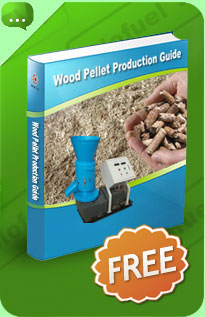Pellets Press
Pellets Press
Pellets presses are utilized to compress various raw materials into pellets. Pellets are small cylindrical cylinders, and they can be produced in various lengths and diameters. There are numerous purposes for a pellets press and advantages from compressing raw materials, such as reducing transportation costs.
Pellets Press and Increasing Bulk Density
By processing raw materials via a pellet press, it's possible to increase the bulk density of many raw materials, possibly by a factor of ten. By increasing bulk density, an increased quantity can be transported and stored within the same volume. Therefore this reduces transportation costs, and keeps the number of lorries and boats required to a minimum. Also storage space required can be reduced. So in pellet stoves for instance, the hopper can hold a certainly better amount of fuel in pellet form apposed to loose wood shavings.
Pellets Flow Like a Liquid
By compressing the raw material in a pellet press, the pellets produced have an increased bulk density and therefore a higher specific gravity. This means in a hopper pellets behave like a liquid, and therefore are unlikely to cause issues with bridging in the hopper. If you take uncompressed wood shavings for instance, in a hopper the flow will be halted by issue with the shavings falling through the hopper, and the weight of the shavings and the support of the angle of the hopper are of equal force. By increased the specific gravity of the shavings by processing in a pellet press into pellets the forces are no longer equal, and the weight of the pellets causes them always to fall to the base of the hopper. This stops the risk of material bridging.
Biomass Boiler Benefits From Pellets
Most biomass boilers use logs or maybe wood chips as a fuel source. By utilizing pellets in these boilers you might not have the automation of a specifically designed pellet boiler, but you will achieve a higher combustion temperature and a better heat output.
Pellet Presses and Wood Pellets
Fairly recently due to concerns over climate change and fossil fuel prices attention for alternative fuels such as wood pellets has been growing. By compressing wood into pellets has the previously mentioned advantages of reduced storage and delivery requirements and flowing characteristics in hoppers. Another key advantage of wood pellets and increased density is with regards to combustion efficiency. By compressing a fuel, a much higher combustion temperature can be achieved. An increased combustion temperature results in more useable heat extracted from the fuel, and reduced ash percentage due to a more complete burn. The ash can even be used on your garden.
Energy Alternatives To Oil and Gas
There are various reasons why we need to move away from our dependence on fossil fuels, and the greater use of the pellet press can bring us nearer to this objective. Most of the focus is on processing the waste from the timbre industry; however there are huge amounts of local biomass that can be processed to make pellet fuels for the local community. This could also bring new local jobs to areas which currently have high unemployment.

